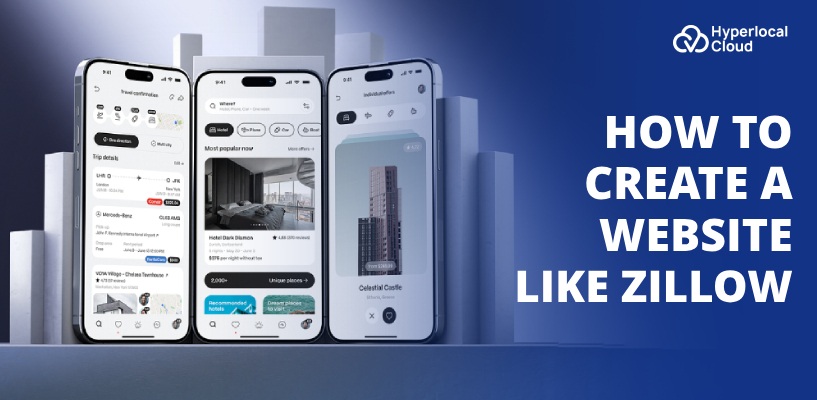How To Create A Website Like Zillow

The real estate industry is on the verge of rising, and more so, taking this business online has amplified the growth to new heights. Various popular real estate marketplaces have successfully become the hot favorites of businesses and the end-users. Building a website like Zillow is lucrative, and if you want to invest in this venture, this article is for you. We have illustrated every possible detail, including the development process, revenue model, features, benefits, and much more.
Before getting started with the nitty gritty, let’s have a basic understanding of the backdrop of the Zillow website.
Understanding Zillow And Its History
Zillow started its journey in 2006 by Rich Barton and Lloyd Frink, who were formerly working as Microsoft executives. Within three days of the launch, their idea grabbed traction and enticed millions of users across 300 cities. One of the biggest USPs of the Zillow site is the unmatchable business model that draws popularity among buyers, sellers, and homeowners.
From 2022-2030, the real estate market size is estimated to grow at a CAGR of 5.2%. As per reports, for 2025, Zillow anticipates 4.16 mn sales, with home values estimated to boost to 2.2%, which is insane.
With such impressive figures, it wouldn’t be wrong to state that the future of Zillow is bright, making it an excellent opportunity for entrepreneurs to build a Zillow clone in the form of an app or website.
Zillow is an American tech real estate marketplace that provides recommendations to users regarding location and past search activities. It acts as a perfect platform for users to quickly look for properties and connect with real estate agents, thereby establishing transparency and trust.
The work starts with gathering data from different sources and using that to create profiles of various homes with photos of the properties. With search tools, users can search for the location, set price, and desired number of rooms.
The property owners will list their properties for sale on the platform, and buyers showing interest will directly deal with them. It helps connect professionals like property managers and real estate agents without hassle.
Want To Build A Website Like Zillow?
Steps To Create A Real Estate Marketplace Website Like Zillow
Building an online platform requires deep research, analysis, implementation, and execution. Take a glimpse of the key development steps follow;
Thorough Market Research
Conducting extensive market research about the platform is important to being a game changer and leading the industry. It includes finding the target audience, comprehending their pain points, analyzing the competitors, looking for features within the original website, and determining what other players offer regarding functionalities and services.
Planning
After identifying what encompasses the steps that will prove instrumental in achieving the goals, more specific and clear goals are set, with precise task and resource identification based on which a timeline is set for the task completion.
Feature Integration
Furthermore, to make the app much more appealing with an amplified user experience, functionalities are added that help the product create an edge in the market. Whatever core features are available within the existing website are included, and the latest attributes are added. This phase integrates advanced search filters for property type, price range, locations, interactive map, HQ images/photos, detailed property descriptions, and virtual tours.
Tech-Stacks Integration
All the contemporary tools and technologies are incorporated into the website at this stage. It focuses on both front end & back-end elements, such as making the right choice for the frameworks, databases, top programming languages, cloud infrastructure, messaging tools, etc.
UI/UX Design
Making a visually attractive and intuitive interface is the prime focus of web developers. The website should be easy to use, have seamless navigation, and be optimized for all mobile devices.
Development And Constant Integrations
The website building and coding implementation occurs during this stage. The most critical part is that the developers translate the well-designed wireframes into functional code.
The maximum number of technical tasks occur here, like handling data storage and connecting the website to external services via APIs.
Testing and Launch
When a website like Zillow is developed, multiple tests are conducted: unit, penetration, integration, etc. This helps eliminate abnormalities and irregularities and optimize efficiency and performance.
Constant upgrades and consideration are taken to make the website SEO-optimized so that it ranks perfectly on search engines and is visible to businesses. Another thing is to safeguard user information, which is possible with the implementation of robust security measures.
Launch And Maintenance
Finally, the website is deployed on the dedicated server and launched for public use. In case there is any technical glitch that affects the normal working, then tech support service is offered to make sure that the interface, software, and attributes are updated. Moreover, steps are taken to enhance the user experience, allow bug fixation, and make performance improvements.
Essential Features Of Website Like Zillow: Maximizing The Home Buying Experience
A website like Zillow has a comprehensive suite of features helping users easily buy, sell, and rent properties in the real estate market. Some of the key features that must be included are shown below;
Advanced Search Filter
Enables users to search for houses based on area, price range, type of rooms, square footage, etc. It allows users to select property based on pool, garage, or proximity to schools and public transportation. Moreover, can view properties on an interactive map or through a traditional list view.
Property Listings
This feature shows various properties with a separate page depicting high-quality images and floor plans. Such information as property history, current market value, taxes, neighborhood statistics, and even the estimated monthly mortgage payment is available. Interactive 3D tours or augmented reality tools can also be added to provide a more immersive experience for potential buyers or renters.
Virtual Tours
This feature provides virtual tours or video walkthroughs so users can have a better view of the properties. It is helpful to users who cannot visit the property, like out-of-town buyers or those with busy schedules. The tours give a guided view of the layout of the home, its key features, and surroundings.
Price Estimation Tool
A website like Zillow provides an automated price estimate tool to show users how much the property is worth. This tool is helpful for potential buyers interested in whether the asking price is fair and for sellers wishing to set a proper value for their property.
Mortgage Calculator
The site may allow users to access mortgage lenders or facilitate direct financing applications. Using this facility, users can input the down payment, interest rate, loan amount, and loan term, after which the monthly payment is calculated.
Saved Searches
Users can create accounts, save their favorite properties, and receive automatic alerts when new listings match their criteria. Thus, they streamline the entire process of searching for the right property and ensure that one sees every prospective opportunity.
Agent and Listing Management
Allows the real estate agents and property owners to manage their listings. Agents can upload photos of the properties, update prices, and monitor the status of their listings, whether sold, pending, or active. Furthermore, the site should have communication tools that allow direct messaging between buyers, sellers, and agents.
Market Trends and Neighborhood Insights
A website like Zillow provides insights into market trends, such as current home price trends and changes in rental rates in particular locations. More information concerning the neighborhood involves the ratings of schools, crimes in the locality, neighborhood activities, and walkability ratings that would give proper perspective before considering a property.
Reviews and Ratings
The buyers and renters can read reviews from previous residents or clients to gauge the reputation of specific agents, properties, or neighborhoods. This adds a layer of transparency and trust to the platform.
Mobile App Integration
A website like Zillow is responsive, so there is no difference in user experience between desktop and mobile versions. A mobile app is a valuable tool that lets users browse properties on the go, receive notifications, and take advantage of geolocation capabilities to find homes near one’s location.
Social Sharing and Collaboration Tools
Enables users to easily send property information via social networks, email, or SMS messaging. Collaboration tools such as shared saved lists or comments are also useful for teams working together to find a house.
Property Auctions and Off-Market Listings
A Zillow like website features an off-market or auction listing section, allowing users to bid on properties or find those not exposed much. This provides more potential for a buyer seeking deals.
AI-Powered Chatbots Support
Adding AI chatbots benefits customer service by giving them an instant answer to a typical question. So whether a user is questioning mortgage rates, property feature details, or general site navigation, users can be aided 24/7 during the entire process, boosting engagement and overall user experience.
Bring Your Visions To Reality With A Website Like Zillow!
Top-Notch Monetization Model Of A Website Like Zillow
Tapping into the various sources through which the revenue will be generated helps the website owners earn amplified profits. Take a look below;
Subscription fees
Users, whether agents or buyers, must pay subscription fees to participate in the program monthly or yearly.
Advertising
The premier agents create the targeted ads, which are then displayed on websites like Zillow. Every time a user clicks on the ad, the agent is charged with some money that adds to revenue generation.
Commissions
A certain percentage of commission is charged to the buyer every time a property or house is sold via a website program.
Listing Fees
The website owners charge a significant fee to the property owners to list their homes on the website.
Service Fees
The website owner will be able to charge certain fees to borrowers for mortgage services; therefore, the loan amount will be set.
Business Benefits – Zillow Like Website: Retaining Customers And Increasing User Base
Building a successful real estate marketplace platform provides stupendous benefits to businesses; here, we have included some of them as under;
Increased Customer Engagement
The spectacular features and functionalities help grab the attention of the users. This makes the engagement and interactivity spectacular, therefore amplifying customer engagement by retaining the older ones and attracting the new ones.
Skyrocketed Sales
The more users and traffic on the website, the more importantly, the spectacular experience, engagement power, loyalty programs, and organic marketing generate leads and further conversions. This hyper-personalized experience boosts sales to the optimum level, making it a remarkable investment for the business.
Better Customer Connection
The online website helps in building stronger relationships with clients. This is done by sending notifications about sales and promotions while strengthening the bond irrespective of geographical boundaries. This is one of the biggest advantages of businesses and leads to long-term alliances.
Improved Brand Identity
The outcome of good marketing and the inclusion of creative designs within a website like Zillow increases the brand image. The online platform helps perfectly understand user behavior by catering to the target audience and making resolutions to enhance the service quality.
Amplify Your Sales With A Website Like Zillow
Hire Hyperlocal Cloud As Your Real Estate Marketplace Development Company!
Various parameters compel entrepreneurs across the globe to consider us as their partners. Our developers are rated high, and they have extensive domain knowledge and relevant skills to take your website to the heights of success.
We are among the best real estate software development companies that have helped businesses flourish and gain an edge over competitors. Our skilled wizards have hands-on experience in building tech-savvy platforms with splendid features and designs.
At Hyperlocal, we focus on delivering exceptional solutions and building real estate projects that fetch outstanding results. Our proficient team uses a straightforward approach and agile methodologies to complete the project within the decided timeline without hampering the quality.
Transform your dreams into reality with our services!





